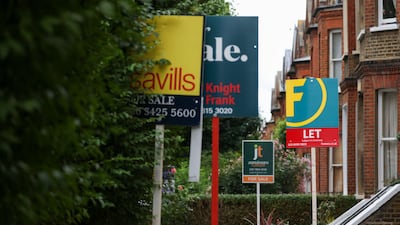British house prices were more than 5 per cent lower in September compared to a year earlier, matching a fall the previous month which represented the biggest annual drop since 2009.
Figures from mortgage lender Nationwide showed the average house price in September was around £14,500 lower than a year ago, or 5.3 per cent down.
But in month-on-month terms, prices were the same in September after a 0.8 per cent fall in August, the lender said.
That meant the average price of a home remained unchanged at £257,808 ($314,060) after two months of falls.
Economists had predicted a month-on-month drop of 0.4 per cent.
“Investors have marked down their expectations for the future path of Bank Rate in recent months amid signs that underlying inflation pressures in the UK economy are finally easing,” said Robert Gardner, Nationwide’s Chief Economist.
“If sustained, this will ease some of the pressure on those remortgaging or looking to buy a home.”
Signs of stabilisation came after the average borrowing rate on a five-year fixed-rate deal fell below 6 per cent for the first time since early July last week.
While borrowing rates on home loans have started to cool after jumping earlier in the summer, they are still at painfully high levels for Britain’s squeezed families.
Bank of England data suggests that interest rates on new mortgages are more than triple their level in early 2022.
The south-west of England was the weakest performer in the third quarter of this year, with prices down by 6.3 per cent annually. Northern Ireland was the strongest.
“The downturn in house prices probably has only a few months left to run,” said Samuel Tombs, chief UK economist at Pantheon Macroeconomics. The market is “close to bottoming out,” he said.
Nationwide said that sales of flats are holding up better than other properties as stretched affordability forces buyers to seek out smaller, cheaper homes.
However, flats also saw the biggest year-on-year fall in quarterly data released by the lender.
The price slump eased in London with values down 3.8 per cent in the third quarter compared to a year ago, an improvement from the 4.3 per cent fall the previous quarter.
Britain's housing market has slowed as borrowing costs mount, but the fall in house prices remains less marked than their jump of about 25 per cent between the start of the coronavirus pandemic and September last year.
Last month, the Bank of England kept the Bank Rate on hold after 14 back-to-back increases that could help to ease some of the pressure on people remortgaging or looking to buy a home, Robert Gardner, Nationwide's chief economist, said.
The combination of rising wages and lower house prices and mortgage rates will probably improve affordability in the housing market over time although it was set to remain subdued in the interim, he said.
Transaction volumes for flats were holding up better than other property types, possibly reflecting how prices for smaller homes did not rise as much during the pandemic, Nationwide said.


